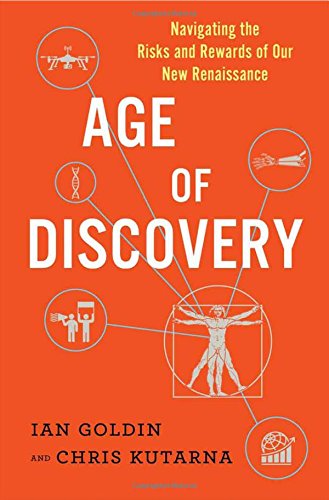We have all grown up reading the the discoveries made by Copernicus, Newton, Galileo and many others. Discoveries that defined the path to progress and made life on Earth what it is today. Even after 500 years, these discoveries and inventions dominate the hallways of science and form the basic building blocks for everything that we learn. Is the age of discovery behind us or is there another one in the making?
Aren’t we supposed to be smarter and better equipped to make similar discoveries today than when these people didn’t even have a telescope to gaze at the stars? Have we lost the appetite for research or the inquisitiveness that even after centuries these discoveries are still some of the defining moments in human history? Kris Kutarna and Ian Goldin think otherwise. The authors believe the time is ripe for new discoveries and inventions that will define the next couple of centuries, and perhaps bring about a paradigm shift in the way we live.
Chris Kutarna is a two-time Governor General’s Medallist, a Sauvé Fellow and Commonwealth Scholar, and a Fellow of the Oxford Martin School with a doctorate in politics from the University of Oxford.
Ian Goldin, Professor of Globalisation and Development at the University of Oxford, is also Director of the innovative Oxford Martin School. Before moving to Oxford University in 2006, Professor Goldin was Vice President of the World Bank and Director of Policy for the World Bank Group.
 Age of Discovery: Navigating the Risks and Rewards of Our New Renaissance
Age of Discovery: Navigating the Risks and Rewards of Our New Renaissance
Author: Ian Goldin, Chris Kutarna
Hardcover: 320 pages
Publisher: St. Martin’s Press (May 24, 2016)
ISBN: 1250085098, 978-1250085092
The first part of Age of Discovery is a detailed commentary on how different inventions and discoveries during the renaissance era brought about lasting change. From the fundamental realizations about our solar system to the invention of printing press by Gutenberg, these discoveries changed our way of life.
The authors then show us how advances in nano-science are poised to bring about a radical change in our physical world. Most of the solutions that were limited because of the time they took to solve and because of the limited processing power – like mapping the human genome – are on the cusp of taking a quantum leap. Truly, a quantum leap. The authors dive into the latest technological innovations that can help us do in minutes that would have taken decades and centuries, with aid of quantum computers.
The authors chart various developments from different fields from astronomy to mathematics, to medical science and show us how we are poised to enter a never before experienced era of innovations and discoveries. They highlight the facts to show us how today we are once again facing global conditions that marked the renaissance era and created an environment for new discoveries and inventions.
The authors point out that although globalization was supposed to minimize risk, our pursuit of common monetary goals have created hubs of activity and thus made everyone vulnerable to unforeseen risks. Radical thoughts and actions are taking roots in every democratic society. But for all these immediate risks, we are at a much better position, if you look at the last thousand plus years. The call here is to be cautious, but also to take risks, be courageous, and make bold moves.
Age of Discovery is a book we should all read. It not only chronicles the feats of modern science in great detail, but also sheds lights on the different social and economic factors that brought about these discoveries. Just as specific conditions brought about an era of modernity, the authors show us how certain conditions brought about a reversal and turmoil. We can learn from these historical shifts and chart a way where thousand years from now, the beginning of 21st Century marks the pivotal point, only if we desire and resolve to be more accommodating and accepting of different views from those around us.